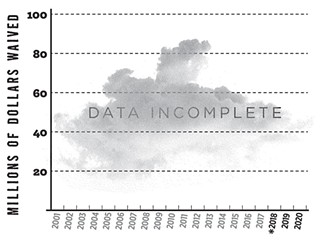A Lack of Info for Affordable Housing Initiative
City pledges to keep better track of SMART money
By Margaret Nicklas, Fri., April 20, 2018

Beginning this month, city departments are using a new process to enter fees they waive into the city's accounting system. That's according to Deputy Budget Officer Diane Siler, who helped implement the change. Monthly reports that show total fees waived citywide in certain broad categories should become available in early May. The change – years in the making – was spurred by a city audit last November reporting that some departments kept track of waived fees and others didn't – and that the city had no way of aggregating such information citywide.
Particularly lacking was information about SMART Housing fees. Auditors found that two of the five departments participating in SMART Housing could not identify fees they had waived related to the program. Previous audits in 2002 and 2015 tasked the Neighborhood Housing and Community Development, which administers the program, with coordinating to ensure these amounts were tracked and made reportable. But the issue remained unresolved, pushing City Auditor Corrie Stokes to appeal directly to the city manager in her November report.
SMART Housing was created in the early 2000s to encourage affordable housing. The program offers developers free or discounted city services and the promise of expedited project reviews. The developers in turn pledge that some housing they build will be rented or sold at affordable rates for a certain number of years. Participating developers receive complete or partial discounts on everything from building permits and sidewalk inspections to the necessary infrastructure to extend power lines. Benefits are based in part on how many affordable units developers say they will offer as a percentage of their total project. As the administrator, NHCD notifies participating departments that projects are certified to receive waivers, and is responsible for monitoring compliance with affordability standards once projects are complete. Individual departments provide services and waive associated fees during project development.
The city's new system will not enable reporting on fee waivers for individual projects. But NHCD is working with other departments to collect data that will address this need, said NHCD Director Rosie Truelove. "We are looking to implement reporting that would allow us to stratify the data in multiple ways, including the total amount of fee waivers per development, by department, and fee waiver type, and what we got in terms of affordable units." City Council members have asked for such information in hopes of better assessing the program's costs and benefits.
Tracking may have improved somewhat already, though data remains incomplete. Four city departments provided information in response to open records requests which indicated the city waived at least $4.6 million for SMART Housing in 2017. NHCD also reported that 14 developers participated in SMART Housing in 2017, with another 17 participating in density bonus programs that may also qualify for waivers, and that 1,459 affordable units are anticipated from these developments. Once the city's and NHCD's improvements are fully implemented, a complete accounting of how much the city spends in incentives per unit and per developer, as well as in total, should be available.
Knowing how much developers receive in waivers should improve transparency regarding how waivers can affect city budgets, especially in the face of increasing development costs. As fees rise, so do waiver amounts. The potential effect may be most apparent with the city's utilities.
The Pilot Knob development, southeast of Austin, helps illustrate that point. The project came under scrutiny in 2016 for the effect SMART Housing fee waivers were projected to have on Austin Water's budget – upward of $51.5 million, said AW management, after City Council voted in 2015 to grant waivers in exchange for the developer's contributions to an affordable housing fund. By March of 2016, the city faced a lawsuit over the way the Council vote had been posted and news that offsetting the waivers could raise each customer's bill by 96 cents per month. The primary fee at issue, called a Capital Recovery Fee, had been increased in 2014 to $7,600 per new water service, driven by the rising costs of development to the utility. CRFs previously ranged from $1,100 to $3,900. Pilot Knob later lost eligibility for SMART Housing waivers after Council modified the deal.
No such controversy has arisen for Austin Energy, at least not yet. The utility said in late March that "any waived fees in the past three years from the SMART Housing program had no material effect" on rates; though there may be an impact in 2021 when it next reviews base rates. Utility staff said they could not identify specific projects that received SMART Housing waivers without extensive research. Going forward, AE Financial Manager Rosa Gonzalez said additional data will be captured to facilitate tracking and reporting the waivers. The utility's waivers mainly involve "line extensions," a charge to connect new customers to electricity. Before October of 2012, the utility did not charge anyone for this service.
City auditors will issue a follow-up report on several previous audits on May 23, which may include information on NHCD’s efforts to track waived SMART Housing fees.
Got something to say on the subject? Send a letter to the editor.










